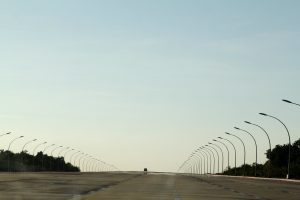Even with swelling protests and mounting international pressure, Myanmar’s new military junta isn’t going anywhere. The generals that seized power on February 1 are from the same group that ruled Myanmar between 1962 and 2010 and as the screws tighten, they are re-visiting the system that kept them in power under their prior incarnation, the State Peace and Development Council (SPDC) junta.
Myanmar’s economy is expected to contract by over 20 percent because of the coup, but Myanmar has been here before. Under the SPDC, Myanmar appeared from the outside crippled by sanctions and wracked by ethnic civil war. Store shelves were often bare and the streets free from cars. For many observers, SPDC Myanmar was a failed state.
But for the generals and the crony business elite, the SPDC days are viewed with nostalgia, and the current regime is re-visiting many of the policies from that era. Under the SPDC, infrastructure development and consumer goods was left to a small elite of crony businessmen. Government contracts for highways, hotels, and the construction of the new capital Naypyidaw were allotted based on relationships and the cronies’ international connections. In conversations with the business elite after the 2011 reforms, many spoke to me nostalgically about the SPDC days when businesses did not have to worry about marketing, business development, and inventory management. Sanctions barred foreign companies from competing with inferior local products, which was fine as far as the cronies were concerned.
Conglomerates like Asia World, Htoo Group, and Win Win Group turned over billions in profits on everything from logging to highway construction and transport while the population eked out a living in abject poverty. The main complaint from the upper-elite was that they had to maintain multiple sets of books to evade taxes, and endure occasional “shakedowns” from army officers or from the military conglomerates.
While the cronies handled domestic projects, military conglomerates like Myanmar Economic Holdings Limited, Myanmar Economic Corporation, and the Myanmar Timber Enterprise (MTE) were responsible for earning foreign exchange. These sprawling and parasitic enterprises contracted the cronies to mine jade or log for export (indeed, logging was done through MTE, which was recently subject to U.S. sanctions, meaning that any timber exports from Myanmar could be subject to sanctions).
While the generals’ propaganda blamed foreign economic sanctions for Myanmar’s economic mess, it was their own policies that were responsible. Indeed, even during the SPDC’s darkest days, Myanmar had access to most non-military goods but chose to restrict imports for fear of draining their meager foreign reserves. Myanmar’s dearth of cars was not a result of foreign sanctions, but because the junta imposed the world’s highest import vehicle tax. Foreign investment was kept away not by sanctions and trade bans, but by Myanmar’s own stifling regulations.
In this regard, sanctions provided a convenient narrative for both the SPDC and its Western rivals: both sides falsely claimed that sanctions were the cause of Myanmar’s economic problems.
In reality, the SPDC’s fear was never international sanctions, but inflation. In 1988, the junta was nearly overthrown when spiking rice prices spurred mass protests. To prevent a repeat, the SPDC refined socialist-style policies that prioritized exchange rate and price stability at the expense of growth. Its Export First program forced companies to match imports with an equal value of exports to prevent trade deficits. For a country with little domestic production, Export First created a paradox: when Myanmar’s economy expanded, imports would surge and drain foreign reserves, causing the kyat’s value to plummet and inflation to rise. The generals were repeatedly forced to intervene by cracking down on imports, which had the side effect of starving the country of foreign goods. Slower growth would ensue, which halted inflation, but lead to empty store shelves and stalled development plans. The junta would be forced to open-up the economy, thus re-starting the vicious cycle.
Holding the system together was a vast, bloated security state. The junta’s secret police, which had received training from Romania and East Germany, pervaded all walks of life and enforced strict press censorship. The internet was effectively banned.
The trifecta of anti-inflation policies, a supportive crony business elite, and an omnipresent security state allowed the SPDC to maintain power despite being loathed by the population, facing unending ethnic civil war, and being subject to sanctions. Polls and election results suggest the Myanmar military’s support stands at under 20 percent. While nowhere near a democratic mandate, history shows that regimes can survive comfortably with minority support. In East Germany for example, the country remained stable from 1946 until 1991 with about 20 percent support; only disintegrating after the Soviet bloc’s collapse. In Myanmar, change in 2010 did not come from below, but on the generals’ terms, when the SPDC dissolved itself and held elections under a rigged, pro-military 2008 constitution.
Myanmar’s February coup came about after a long decline in relations between the NLD and the military that culminated in a disastrous series of meetings between the two sides in the days before the takeover. But as popular protests have mounted against the brutal regime, the generals are dusting off the SPDC playbook. The dormant security state is being re-invigorated, this time with the benefit of technology from China and Israel.
Protests are met with iron-fisted cruelty. Neighborhood-level government watch lists are being prepared reminiscent of the Eastern European commune-level security. The old business elite are slowly re-gaining lost ground, and gray market links with China are being re-established. The generals are even re-visiting elements of the Export First policy through exchange and import controls.
While domestic and international pressure will make it nearly impossible for Myanmar to become a mainstream player in the international economy, the generals will likely survive. A negotiated settlement between the NLD and the junta may therefore be Myanmar’s only way out of the crisis.

































